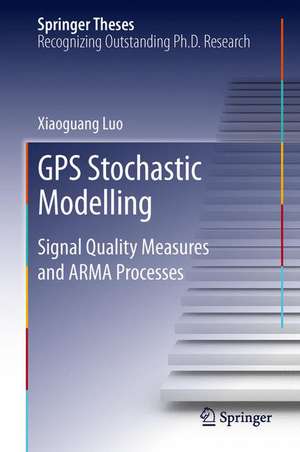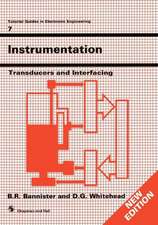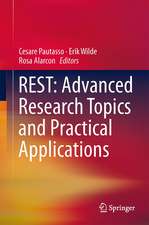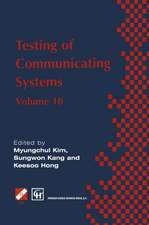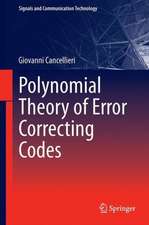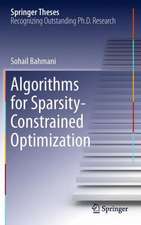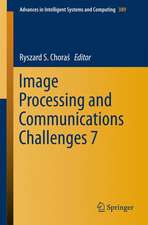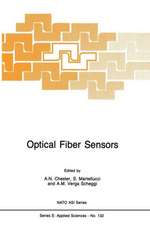GPS Stochastic Modelling: Signal Quality Measures and ARMA Processes: Springer Theses
Autor Xiaoguang Luoen Limba Engleză Hardback – 29 iul 2013
This work extends the stochastic model using signal-to-noise ratio (SNR) measurements and time series analysis of observation residuals. The proposed SNR-based observation weighting model significantly improves the results of GPS data analysis, while the temporal correlation of GPS observation noise can be efficiently described by means of autoregressive moving average (ARMA) processes. Furthermore, this work includes an up-to-date overview of the GNSS error effects and a comprehensive description of various mathematical methods.
| Toate formatele și edițiile | Preț | Express |
|---|---|---|
| Paperback (1) | 947.35 lei 6-8 săpt. | |
| Springer Berlin, Heidelberg – 27 sep 2016 | 947.35 lei 6-8 săpt. | |
| Hardback (1) | 952.09 lei 6-8 săpt. | |
| Springer Berlin, Heidelberg – 29 iul 2013 | 952.09 lei 6-8 săpt. |
Din seria Springer Theses
- 18%
 Preț: 997.88 lei
Preț: 997.88 lei -
 Preț: 389.88 lei
Preț: 389.88 lei - 15%
 Preț: 646.94 lei
Preț: 646.94 lei - 18%
 Preț: 943.43 lei
Preț: 943.43 lei -
 Preț: 399.29 lei
Preț: 399.29 lei - 18%
 Preț: 944.99 lei
Preț: 944.99 lei - 15%
 Preț: 636.80 lei
Preț: 636.80 lei - 18%
 Preț: 941.05 lei
Preț: 941.05 lei - 15%
 Preț: 643.16 lei
Preț: 643.16 lei - 15%
 Preț: 642.68 lei
Preț: 642.68 lei - 18%
 Preț: 1103.62 lei
Preț: 1103.62 lei - 20%
 Preț: 558.82 lei
Preț: 558.82 lei - 18%
 Preț: 1112.30 lei
Preț: 1112.30 lei - 18%
 Preț: 944.19 lei
Preț: 944.19 lei - 18%
 Preț: 1109.92 lei
Preț: 1109.92 lei - 18%
 Preț: 1217.27 lei
Preț: 1217.27 lei - 15%
 Preț: 640.06 lei
Preț: 640.06 lei - 15%
 Preț: 636.45 lei
Preț: 636.45 lei - 15%
 Preț: 640.06 lei
Preț: 640.06 lei - 15%
 Preț: 640.88 lei
Preț: 640.88 lei -
 Preț: 389.70 lei
Preț: 389.70 lei - 20%
 Preț: 563.89 lei
Preț: 563.89 lei -
 Preț: 393.35 lei
Preț: 393.35 lei - 15%
 Preț: 637.93 lei
Preț: 637.93 lei - 15%
 Preț: 641.85 lei
Preț: 641.85 lei - 18%
 Preț: 1225.94 lei
Preț: 1225.94 lei - 20%
 Preț: 551.36 lei
Preț: 551.36 lei - 18%
 Preț: 1229.10 lei
Preț: 1229.10 lei - 15%
 Preț: 639.25 lei
Preț: 639.25 lei - 18%
 Preț: 999.45 lei
Preț: 999.45 lei - 15%
 Preț: 640.06 lei
Preț: 640.06 lei - 18%
 Preț: 1220.45 lei
Preț: 1220.45 lei - 18%
 Preț: 1116.26 lei
Preț: 1116.26 lei - 18%
 Preț: 1110.72 lei
Preț: 1110.72 lei - 18%
 Preț: 1000.87 lei
Preț: 1000.87 lei - 18%
 Preț: 891.17 lei
Preț: 891.17 lei - 15%
 Preț: 640.06 lei
Preț: 640.06 lei - 5%
 Preț: 1154.07 lei
Preț: 1154.07 lei - 15%
 Preț: 635.96 lei
Preț: 635.96 lei - 15%
 Preț: 640.88 lei
Preț: 640.88 lei -
 Preț: 387.20 lei
Preț: 387.20 lei - 18%
 Preț: 1109.92 lei
Preț: 1109.92 lei -
 Preț: 385.25 lei
Preț: 385.25 lei -
 Preț: 385.25 lei
Preț: 385.25 lei - 18%
 Preț: 1112.30 lei
Preț: 1112.30 lei - 18%
 Preț: 999.45 lei
Preț: 999.45 lei -
 Preț: 386.99 lei
Preț: 386.99 lei - 15%
 Preț: 637.13 lei
Preț: 637.13 lei - 20%
 Preț: 554.20 lei
Preț: 554.20 lei - 20%
 Preț: 555.57 lei
Preț: 555.57 lei
Preț: 952.09 lei
Preț vechi: 1161.08 lei
-18% Nou
Puncte Express: 1428
Preț estimativ în valută:
182.18€ • 190.72$ • 150.74£
182.18€ • 190.72$ • 150.74£
Carte tipărită la comandă
Livrare economică 05-19 aprilie
Preluare comenzi: 021 569.72.76
Specificații
ISBN-13: 9783642348358
ISBN-10: 3642348351
Pagini: 280
Ilustrații: XXIII, 331 p. 129 illus., 127 illus. in color.
Dimensiuni: 155 x 235 x 25 mm
Greutate: 0.64 kg
Ediția:2014
Editura: Springer Berlin, Heidelberg
Colecția Springer
Seria Springer Theses
Locul publicării:Berlin, Heidelberg, Germany
ISBN-10: 3642348351
Pagini: 280
Ilustrații: XXIII, 331 p. 129 illus., 127 illus. in color.
Dimensiuni: 155 x 235 x 25 mm
Greutate: 0.64 kg
Ediția:2014
Editura: Springer Berlin, Heidelberg
Colecția Springer
Seria Springer Theses
Locul publicării:Berlin, Heidelberg, Germany
Public țintă
ResearchCuprins
Introduction.- Mathematical Background.- Mathematical Models for GPS Positioning.- Data and GPS Processing Strategies.- Observation Weighting Using Signal Quality Measures.- Results of SNR-based Observation Weighting.- Residual-based Temporal Correlation Modelling.- Results of Residual-based Temporal Correlation Modelling.- Conclusions and Recommendations.- Quantiles of Test Statistics.- Derivations of Equations.- Additional Graphs.- Additional Tables.
Recenzii
From the reviews:
“The book is mathematical in that it is intended for readers who have a working knowledge of mathematical tools for communications systems. While the book is reasonably self-contained in terms of reviewing mathematical prerequisites and giving a broad view of the physical elements affecting GPS performance, at a technical level it is really intended for readers interested in designing components of GPS systems, or in policies pertaining to GPS systems.” (Joseph D. Lakey, Mathematical Reviews, March, 2014)
“The book is mathematical in that it is intended for readers who have a working knowledge of mathematical tools for communications systems. While the book is reasonably self-contained in terms of reviewing mathematical prerequisites and giving a broad view of the physical elements affecting GPS performance, at a technical level it is really intended for readers interested in designing components of GPS systems, or in policies pertaining to GPS systems.” (Joseph D. Lakey, Mathematical Reviews, March, 2014)
Notă biografică
Xiaoguang Luo is currently a research associate at the Geodetic Institute of Karlsruhe Institute of Technology (KIT), Germany. He received his Ph.D. in Geodesy and Geoinformatics from KIT in 2012. He is interested in analysing the stochastic model, atmospheric and site-specific effects of GNSS observations, with a special focus on statistical testing and time series modelling.
Textul de pe ultima copertă
Global Navigation Satellite Systems (GNSS), such as GPS, have become an efficient, reliable and standard tool for a wide range of applications. However, when processing GNSS data, the stochastic model characterising the precision of observations and the correlations between them is usually simplified and incomplete, leading to overly optimistic accuracy estimates.
This work extends the stochastic model using signal-to-noise ratio (SNR) measurements and time series analysis of observation residuals. The proposed SNR-based observation weighting model significantly improves the results of GPS data analysis, while the temporal correlation of GPS observation noise can be efficiently described by means of autoregressive moving average (ARMA) processes. Furthermore, this work includes an up-to-date overview of the GNSS error effects and a comprehensive description of various mathematical methods.
This work extends the stochastic model using signal-to-noise ratio (SNR) measurements and time series analysis of observation residuals. The proposed SNR-based observation weighting model significantly improves the results of GPS data analysis, while the temporal correlation of GPS observation noise can be efficiently described by means of autoregressive moving average (ARMA) processes. Furthermore, this work includes an up-to-date overview of the GNSS error effects and a comprehensive description of various mathematical methods.
Caracteristici
Outstanding doctoral thesis nominated for a Springer Theses Prize by Karlsruhe Institute of Technology, Germany This work is a key step towards a realistic GNSS stochastic model, and provides good examples of statistical verification and physical interpretation of results This thesis gives an up-to-date overview of the GNSS error effects and a comprehensive description of the mathematical models Various statistical tests and methods of time series analysis are included, which can be applied in other research fields
